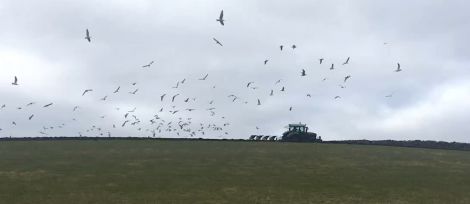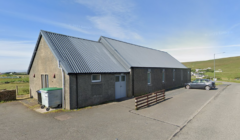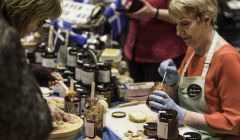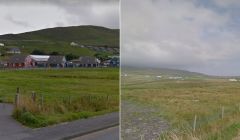Letters / Supermarkets dictate what we eat and how it is produced
One advantage of Shetland’s geographical isolation is that it enables us to observe the effects of changes on the UK mainland from afar and decide whether or not we want to adopt them in Shetland.
The capture of local economies by supermarket chains has been a sad chapter in the history of modern Britain. High streets and town centres across the country that bustled for centuries have become culturally sterile, with family run bakers, butchers and greengrocers wiped out in a generation by predatory supermarket chains.
Supermarkets’ success has been on the back of cheap food: households spend significantly less on food today than they did many years ago. Food shopping is also more convenient, again thanks to supermarkets. So how have they done this?
Supermarkets control our food systems. They dictate what we eat and how it is produced. Farmers have been forced into an unenviable position: either buy designer seeds from multinational agribusinesses; pour industrial fertiliser, pesticides and herbicides on to the fields and pack animals tightly into sheds, fatten them up with Brazilian soya and treat them with prophylactic antibiotics, or go out of business.
Intensive farming like this comes at a huge cost. Indiscriminate antibiotic use in animals breeds resistant bacteria – threatening human health. Weeds and pests develop resistance to conventional poisons, creating the need for more and more pesticide spraying. Bees die. Earthworms die. Microorganisms die. Soil fertility becomes dependent on the regular application of fossil fuel based fertiliser.
UK agriculture has become responsible for 10 per cent of our carbon emissions – it could be carbon negative. This is the real price of a food system controlled by supermarkets – and it doesn’t have to be this way.
Shetland has managed to avoid the worst aspects of industrial farming. Watch a Shetland farmer ploughing their field and you’ll see a boisterous flock of seagulls and crows flying behind the tractor in search of juicy earthworms. On the UK mainland ploughing is an eerily peaceful activity, for there is little life left in the soil; the earthworms have gone.
Become a member of Shetland News
With the right support, Shetland’s farmers, crofters and households could rapidly switch to sustainable production of the vast majority of our own food – certainly all of our meat, fish, dairy, root vegetables and kale.
I have heard people balking at the price of vegetables from Transition Turriefield, a croft in Sandness that operates a vegbox scheme and supplies small businesses in Shetland. “£1 a courgette? get real” you hear people say. But perhaps it is us that need the reality check – for this is the real price of food, if it is truly to be produced sustainably.
We must reconsider how we value what we put in our mouths. Food poverty is a real issue that must be addressed but the answer is not more supermarkets with their artificially cheap food, it is higher wages and a universal basic income.
Sustainability has become the buzzword of the council. Across Shetland, Covid has kickstarted a surge of interest in food growing. Horticultural skills and knowledge are shared through Facebook, whilst children find delight in the pears, peaches and plums of their parents’ polycrub plantations.
Meanwhile in Manchester, at the headquarters of the Co-operative supermarket chain, top executives awarded themselves six- and seven-figure bonuses in 2020, despite keeping £66m in Covid rates relief from the UK government. This company, clinging on to the “co-operative” name it has betrayed, now wants to open two more supermarkets in Shetland, increasing our dependence on plastic wrapped, intensively farmed food and obesogenic ready meals.
Shetland’s dairy, abattoir and many other local businesses have suffered through the pandemic and are financially vulnerable. With support, they have the potential to be at the centre of a thriving circular local economy. The expansion of Shetland’s supermarket network could tip the balance in the opposite direction, causing the destruction of our entire local food industry. Tesco and the Coop would readily assume the supply of milk and meat to Shetland – increasing our dependence on unsustainable industrial farms on the UK mainland.
In the SIC corporate plan Our Ambition 2021-26, the council promises “we will build the principles of community wealth building into the way we support the local community”. These are wise words – and utterly inconsistent with the Coop’s proposals to build two new supermarkets in Sandwick and Scalloway. We must heed the warnings from the high streets across mainland Britain.
Indeed there are practical ways that our council could act to take our food security seriously. Business grants could help increase production of polycrubs so more folk could grow their own vegetables. Similar grants could also help farmers to build storage facilities to enable year-round supply of root vegetables.
A Shetland seed sovereignty agency could coordinate the collection and distribution of seeds and the identification of new varieties that could produce better yields in our windy, northern climate. The Shetland dairy could be supported to diversify; we could make Shetland yoghurt, cheese and ice cream as well as milk, butter, cream and buttermilk.
Shetland is at a crossroads. We could hand over an entire sector of our economy to unsustainable big business, or we provide strategic support to our local food industry, creating a resilient and thriving local economy for us and for future generations.
Alex Armitage
Shetland Greens
Bigton
Become a member of Shetland News
Shetland News is asking its many readers to consider paying for membership to get additional features and services: -
- Remove non-local ads;
- Bookmark posts to read later;
- Exclusive curated weekly newsletter;
- Hide membership messages;
- Comments open for discussion.
If you appreciate what we do and feel strongly about impartial local journalism, then please become a member of Shetland News by either making a single payment, or setting up a monthly, quarterly or yearly subscription.





































































